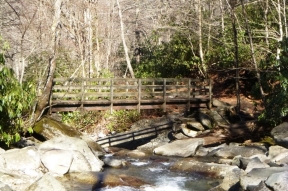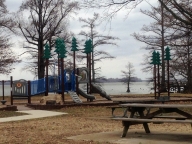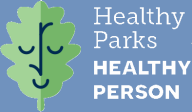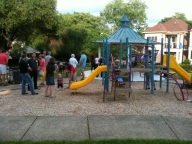Parks
Tennessee is regarded for is natural beauty from the mighty Mississippi in the west to the Great Smoky Mountains in the east. Tennessee is lucky to have many local, state and national parks. Parks offer diverse and varied natural landscapes, family-friendly recreational activities, affordable and varied lodging accommodations, volunteer opportunities and hundreds of interpretive programs and events. Parks allow people to relax, reconnect with Nature and move toward their physical activity goals.

What health benefits do parks provide?
What opportunities for physical activity can parks provide?
What is Healthy Park Healthy Person?
Where are our State Parks located?
Where are our National Parks located?
How can parks be more accessible?
How can parks be made safer?
What makes a good small park?
How do parks conserve and protect land?
What about parks for pets?
How are parks good for the economy?
Government partners
Additional resources
What health benefits do parks provide?
Parks are part of a comprehensive approach to community health. Parks can promote healthy lifestyles and help people achieve their personal physical activity goals. Spending time outdoors offers a variety of health benefits such as:
- Protective vegetation reduces air pollutants, provides shade and absorbs stormwater
- Blue spaces or waterways, lakes and rivers offer recreational activities, provide soothing sights and sounds, and help with stormwater
- Reprieve from noise from the bustle of life allowing for relaxation
- Cognitive benefits leading to improved school outcomes and reduced behavior problems
- Vision benefits as spending time outdoors reduces the risk of myopia in children
- Socialization with family, friends and neighbors is a natural stress reducer
- Physical activity improves well-being and reduces risk of obesity and other illness
What opportunities for physical activity can parks provide?

There are a great variety of parks. Some parks celebrate an important piece of history such as Davy Crockett Birthplace State Park in Limestone or World’s Fair Park in Knoxville. Some parks are huge such as the Great Smoky Mountains Park spanning North Carolina and Tennessee. Some parks are provided for a specific recreational activity such as the Scott Adams Memorial Skate Park in Kingsport or the Hiwassee / Ocoee State Park in Delano. Most all parks are places for increasing physical activity. For some parks the physical activity may simply be walking around as a tourist and for some parks it’s paddling to enjoy the scenery. Here are some great opportunities to increase physical activity while enjoying a park:
- Birdwatching
- Camping
- Canoeing or kayaking
- Hiking
- Mountain biking
- Rock climbing
- Swimming
- Trail running
- Whitewater rafting
- Walking
What is Healthy Park Healthy Person?

The Tennessee Department of Health and the Tennessee Department of Environment and Conservation collaborated to create Healthy Parks Healthy Person TN, a free, web-based app that allows users to earn points for being physically active at any park in Tennessee. The concept for the program originated from the National ParkRx Program, and includes a “park prescription pad” for healthcare providers. Providers interested in the program are provided tabletop signage, a brochure holder and ParkRx pads.
Healthy Parks Healthy Person points are earned by walking, biking, hiking, swimming, paddling, climbing or playing a sport. Points can be redeemed at Tennessee State Parks and include such rewards as a free swim at a state park pool, a free game of golf, a free meal, a free gift shop item and even free lodging! Go to app.healthyparkstn.com to create a free account today! Check out this YouTube video promoting Healthy Parks Healthy Person.
Where are our state parks located?

The Tennessee Department of Environment and Conservation (TDEC) is committed to providing a cleaner, safer environment that goes hand-in-hand with economic prosperity and increased quality of life. Our 56 Tennessee State Parks and Natural Areas provide a variety of quality outdoor recreational experiences like camping, boating and hiking which can improve health through increased physical activity. Visit Tennessee State Parks online to Find a Park near your community.
Where are our national parks located?
For one hundred years, the National Park Service has been entrusted with the care of our nation’s special places. The National Park Service preserves unimpaired the natural and cultural resources and values of the National Park System for the enjoyment, education and inspiration of this and future generations. National Parks conserve natural and cultural resources while providing outdoor recreation. Find a National Park near your community.
How can parks be more accessible?
Providing equal access to parks is a good strategy toward reducing health disparities for some socioeconomic groups. Community parks with parking lots should be considerate of disabled drivers and provide assessable parking. Common ADA style curb ramps and wider sidewalks and entranceways can be built. Plan some park activities that can be enjoyed by all people regardless of age or ability.
How can parks be made safer?
Safety is important for parks. If people do not feel safe in a park, chances are it will be underused. Park infrastructure and playground equipment should be kept in good repair. Equipment should match with the age range of the typical users and soft, absorbent surfaces should be maintained under equipment where falls are possible. Physical hazards can be minimized by routine maintenance. Lights that can be left on into or throughout the night is helpful. Providing safe and convenient pedestrian access to the park for walkers and bikers helps people to come and go more easily. Having the local police or county sheriff check on the park periodically is also good for safety. In some cases, asking the neighborhood to monitor their park to report problems works well.
What makes a good small park?

Not all parks have to be big. Parks are important for social interactions. Even small or “pocket parks” can be beneficial to neighborhoods. Start with good transportation access to the park. Small parks may have parking lots, though many are designed to be used by pedestrians only. Small parks can be good choices in places where abandoned or blighted land is reclaimed for recreational use. Where possible, all parks benefit from shade and drinking water. Here are some ideas for small parks:
- basketball hoops
- community gardens
- park benches
- picnic tables
- playground equipment
- sidewalks or paths
How do parks conserve and protect land?
When land is designated as a park, it saves that green space from development. Some parks or natural areas can protect environmentally sensitive areas. Many parks keep a natural setting with trees and other landscaping. Plants emit oxygen and absorb carbon dioxide and air pollutants. The plans in parks and green spaces are important for helping to control stormwater, especially in areas with lots of impervious pavement. Green spaces also help to absorb heat which can help to reduce urban heat islands.
What about parks for pets?
Although some people think they’re walking their pets, in reality the pets are taking their owners for a walk, too. Parks for pets have quickly become popular. Pet parks are spaces that are usually fenced to allow pets to roam around. Dog parks are the most common pet parks. According to The Association of Professional Dog Trainers dog parks have both advantages and disadvantages. Dog parks should have materials for cleaning up, drinking water and shade, enough space to avoid crowding, entrance and exit fences and gates, no tight fence angles and natural visual barriers within the park. Separate spaces for big and little dogs are also a good idea.
How are parks good for the economy?
Parks often increase property values nearby. Locally, parks provide jobs. Parks are also tourist destinations attracting visitors from near and far. From food to lodging and admission fees to souvenirs, tourism generates spending and tax revenue. In many places tourism has an important benefit to the local economy. According the National Park Service, tourists to the Great Smoky Mountains National Park in 2015 spent $874 million in nearby communities.
Government partners
Tennessee Department of Environment and Conservation (TDEC)
Recreation Edcational Services
www.tn.gov/environment/program-areas/res-recreation-educational-services.html
State Parks
tnstateparks.com
National Parks Service
www.nps.gov
Additional resources
National Recreation and Parks Association
www.nrpa.org
Tennessee Recreation and Parks Association
www.trpa.net
Discover the Forest
www.discovertheforest.org